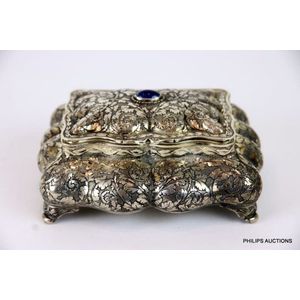Italian Silver Engraved Box with Lapis Lazuli Cabochon
An Italian .800 silver box, mid 20th century, Milan with lozenge and fascio mark, of rectangular bombe and cushion form with a low domed lid and a lapis lazuli cabochon, profusely engraved with Arabesque foliage on a finely textured matt ground, four shaped feet and gilt washed to the interior; hallmarked underside, total weight 301gr, height 2.56 in., length 5.31 in., width 4.53 in.
You must be a subscriber, and be logged in to view price and dealer details.
Register Now to view actual auction price for this item.
- Lapis Lazuli - Lapis lazuli is a semi-precious deep blue coloured stone, sometimes with gold inclusions, that has been used for thousands of years for jewellery, decorative items and decoration.
It is mined in Afghanistan, Siberia, Chile, USA and Burma. The mines in north-eastern Afghanistan are the largest source of lapis lazuli, and have been operating for over 6,000 years.
They were the source of the stone for the ancient Egyptian, Greek and Roman civilsations. - Arabesque - The arabesque pattern is an ornamental design that features flowing, curving lines and elaborate geometric shapes. It is inspired by the art and architecture of the Islamic world and was developed at Fontainebleu France in the mid 16th century. Its use was spread through published engravings, and it is characterized by its intricate and highly decorative nature. The arabesque pattern is created using a repetitive motif that is repeated and interwoven to create a cohesive design. It was used as a form of decoration in art, architecture, textiles, pottery, furniture and ceramics and it is often used to add a sense of grandeur and sophistication to a design. The arabesque pattern is admired for its beauty and complexity, and it continues to be used in a wide range of decorative contexts today.
This item has been included into following indexes:
